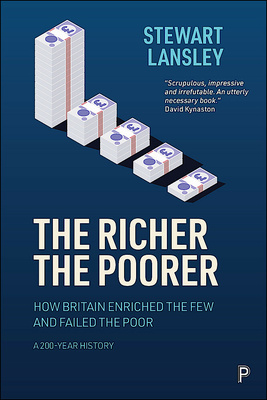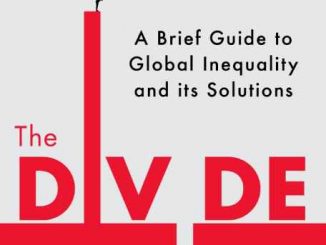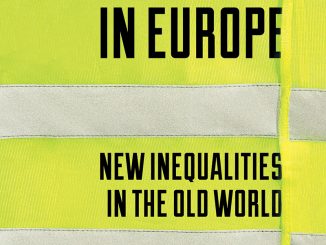Book Review by Tracy Shildrick
When a book covers a 200-year history on any issue you expect to be in for a comprehensive read. This book does not disappoint and provides a meticulously researched account of economic inequality in Britain over the last two centuries. The book packs a punch in terms of evidence from many of the ‘heavy weights’ in this field and it tells a depressing but very important story. Crucially, the book extends our understanding of inequality by showing the clear, dependent relationship, between poverty and wealth creation. The book forces readers to confront, not just the reliance of the rich on the poor to make  money, but also the long-standing and stubborn nature of this relationship in Britain. Lansley points out that whilst the period during and after the Second World War was one where the inequality gap shortened and there was some ‘taming of the forces that favoured the richest members of society’ (p99) there has been no such taming since the 1980s. Indeed what Lansley calls ‘extraction capitalism’ has been encouraged to run wild in Britain and it has resulted in extremes of economic inequality. The rich have got very rich indeed and the wealth gap in Britain remains one of the highest in the OECD with only the US being more unequal https://www.resolutionfoundation.org/app/uploads/2022/07/Arrears-fears.pdf
money, but also the long-standing and stubborn nature of this relationship in Britain. Lansley points out that whilst the period during and after the Second World War was one where the inequality gap shortened and there was some ‘taming of the forces that favoured the richest members of society’ (p99) there has been no such taming since the 1980s. Indeed what Lansley calls ‘extraction capitalism’ has been encouraged to run wild in Britain and it has resulted in extremes of economic inequality. The rich have got very rich indeed and the wealth gap in Britain remains one of the highest in the OECD with only the US being more unequal https://www.resolutionfoundation.org/app/uploads/2022/07/Arrears-fears.pdf
The book takes a chronological approach with each relatively short chapter concisely overviewing the particular political and economic approaches taken at various point in time. Lansley asks the important question, ‘Why does a ‘cycle of privilege’ that perpetuates wealth at the top and disadvantage at the bottom remain as embedded today as it did in the distant past’ (p 2). This is a critical question as ‘extractive capitalism’ in the most extreme forms has very much become the norm in Britain, particularly over the last forty years of so. It’s a economic system that causes devastation for many citizens, leading to shorter, more difficult and often severely traumatised lives and yet still the system marches on largely unchallenged. Given the sheer scale of inequality and the damage it causes for many one might expect to witness more public discussion or concern around these issues. Part of the explanation for this tolerance of inequality lies with the widely touted rhetoric that tends to laud wealth as a good thing, that benefits not just individuals but society as a whole. Whilst the notion that wealth tends to trickle down and ‘float all boats’ has been proven to generally not be the case, it has proved an enduringly popular idea. Indeed only very recently Boris Johnson, Prime Minister, seemed happy enough to openly refer to the benefits of ‘capitalism and greed’ when talking about the success of the COVID-19 vaccination programme at a private meeting with MPs. https://blogs.lse.ac.uk/politicsandpolicy/greed-my-friends/
The facts around poverty and wealth are rarely laid bare within the public domain, with both conditions often being misrepresented and shrouded in mystery and mythology. The advent of what many describe as the ‘consumer society’, accompanied by general rising standards of living during the post-World War Two period have done much to mask the realities of poverty and inequality. The widespread accessibility of ready consumption, including the expansion of home ownership for many, often came with high costs, particularly in terms of debt accumulation for those without the cushions of wealth. That same debt accumulation also bolstered the already plump cushions of the rich. People have been encouraged to either ‘make it or fake it’ with the ever present fear of poverty stigmatisation pushing people into more and more expensive debt and the elusive prize of financial security (even in the simplest of terms in being able to meet basic everyday needs without financial stress and strife) becoming an ever more distant dream for many. Indeed, many people in Britain are being deliberately left in very deep poverty and increasing numbers of British citizens face destitution https://www.jrf.org.uk/blog/disability-destitution
Owning wealth in Britain has been very much framed within an aspiration lens with what Tony Blair described as a ‘politics of envy’ (p 166) to be avoided at all costs. As the book shows whilst New Labour did a lot to tackle child poverty in 1990s – a useful reminder to us all that poverty can be reduced by policy interventions – they remained very relaxed about wealth creation. There is a useful reflective chapter (Afterword) at the end of the book which reflects on the COVID-19 pandemic and whether this will become a pivotal moment that prompts a change of direction. The pandemic certainly threw a very visceral and often cruel light on the implications of gross inequality. Whilst those on lowest incomes suffered most during the COVID pandemic, not just through loss of jobs and incomes, but they were also more likely to catch COVID and to die from it. At the other extreme the rich were not just more able to protect themselves from catching COVID-19 but many were able to financially benefit from the pandemic. Some people benefitted a lot. It was recently reported that ‘eye-watering’ sums of money had been given to private companies to deliver the track and trace system during the height of the COVID-19 pandemic (with much of the money being paid to private consultants earning on average £1100 a day and some earning much more). A report by MP’s showed that the system had failed spectacularly in its objectives https://www.bmj.com/content/375/bmj.n2606
Additionally, such contracts were awarded to companies that had close ties to MP’s (the track and trace contracts were headed up by Dido Harding, a Conservative life peer) and many contracts were awarded without due processes being observed. Yet, when these sorts of examples emerge in the public domain they tend not to provoke any major public outcry. The rhetoric around poverty and inequality helps ameliorate public concern and in addition these examples are often explained away as rarities, products of moments of crisis (as in the pandemic). As Lansley’s book makes crystal clear these sorts of behaviours are deeply embedded in the current economic system. The awarding of the COVID contracts, the subsequent under performance of many of those contracts and the large sums of money that were paid to both individuals and private companies were not a one-off, an aberration, but the long-standing norm for a society that concentrates wealth and power in the hands of a few, and supports them in continuing to perpetuate that wealth. Nepotism, greed, cronyism, irregular business dealings, tax evasion are hard baked into an economic model that supports excessive wealth creation for the few at the expense of the majority. Boris Johnson’s comments about capitalism and greed may not have been accurate in respect of the COVID-19 vaccine programme (greed was not the over-riding motivation in either the development or distribution of the vaccine) but the comments were, a perhaps somewhat rare, moment of truthfulness and clarity on our socio-economic system in general (and from a Prime Minister not generally known for his honesty or candour).
The book makes clear that no political party, of any colour, has been willing to tackle the issue of wealth and the rich. In many ways no party has ever had to. Additionally, many MP’s themselves tend to come from wealthy backgrounds and the voices of those experiencing poverty tend to go largely unheard. Of course, the wealthy have little to personally gain and probably much to lose by bringing these sorts of questions and conversations to the fore. As Lansley rightly notes any sort of levelling up with also require some levelling down. To add to the problem poverty also suffers a similar problem of misrepresentation in public debate. So deep rooted is the stigma, negative stereotyping and belief that anyone experiencing poverty or related disadvantage is culpable through their own behaviours that even those in very deep poverty tend to downplay or deny their condition https://journals.sagepub.com/doi/10.1111/1467-954X.12018
The fact that the vast majority of children living in poverty live in a household where at least one person is in a job and many people in paid employment are now reliant on food banks to feed themselves and their families, seems less effective at capturing the public imagination then popular television programmes like Benefit Street that play to extreme stereotypes that stigmatise and misrepresent those experiencing poverty. Furthermore, these stereotypes of the underserving poor do much critical work to garner support for punitive policies that further punish rather than support those on low incomes. Wider understanding of what causes poverty in Britain (low wages, high housing costs and an inadequate out of work benefit system) all the while continue to hide in plain sight.
In the end it might be that no one event or crisis will be the catalyst that will lead to real change. The pandemic has shifted the debate a little in so far as poverty and economic hardship is now more visible in public debate. There is increased uneasiness around insecure and low paid work. It has not gone completely unnoticed that those were lauded as heroes as they cooked, cleaned, served and cared for the nation at the height of a pandemic were also often working in some of the most insecure and lowest paying jobs in the economy. As the numbers forced on to Universal Credit skyrocketed in the early days of the pandemic, with many claimants having no previous experience of the out of work welfare system, the frailties and unfairness of the system, were suddenly exposed in ways that had previously remained largely hidden. The two-child limit policy is one of the cruellest and most damaging policies ever inflicted on work-aged benefit claimants in this country, the majority of whom also happen to be in paid work. The policy, unsurprisingly, has been shown to be deeply damaging for children living in poverty https://nechildpoverty.org.uk/news/over-15-000-north-east-families-now-caught-by-two-child-limit
It was, however, a policy that was generally very popular with the general public. The supposed ‘common-sense’ of families being forced to make sound financial choices in respect how many children they could afford suddenly seemed to make less sense as many were forced to confront the reality that circumstances could – and in many cases did – change very quickly. Almost overnight poverty became a possibility for many rather than the preserve of those that are all too often perceived as the unfortunate ‘other’. It might well be that the current cost of living crisis will also help to further enliven public debate. The British public care very much about fairness and only around 20% believe that wealth difference are fair https://www.bsa.natcen.ac.uk/latest-report/british-social-attitudes-37/fairness-and-justice-in-britain.aspx
Change is likely to be slow and incremental. There are useful suggestions in the book as to how policies could be used to start to redistribute in ways that would narrow the gaps between rich and poor, but this does require political will and there is currently little sign that any party is ready to seriously grapple with these issues. As poverty spreads up the income scale, as it is inevitably going to amidst dramatically rising energy costs and the general cost of living crisis, poverty and the real risk of it will become ever more real for more and more people. No doubt we will continue to hear that blame lies in moments of crisis, whether than be COVID, Brexit or latterly the war in Ukraine. The book is a useful and important reminder that the economic problems that most of us will increasingly have to face have been a long time in the making and so it is unlikely that there be any quick road to their unmaking.
Tracy Shildrick is Professor of Inequalities at Newcastle University
The Richer, The Poorer: How Britain enriched the few and failed the poor – A 200-year history by Stewart Lansley
Publisher: Policy Press
ISBN: 978-1447363217




Be the first to comment